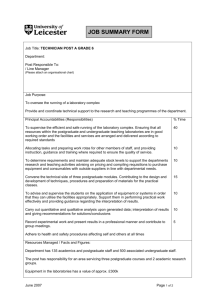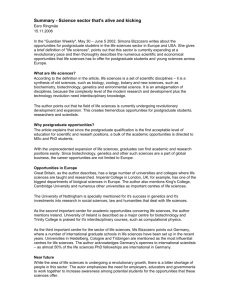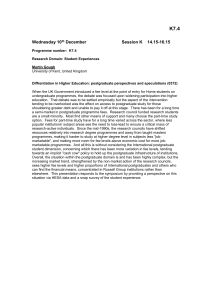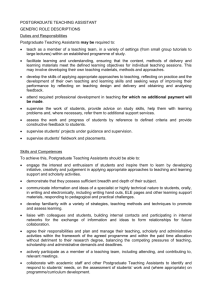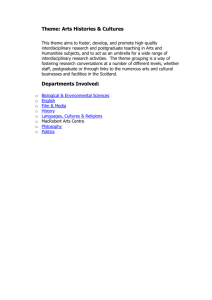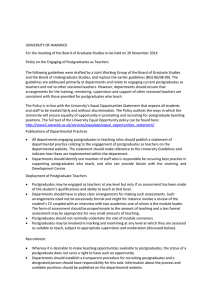Queen`s University Centre for Educational Development TQEF
advertisement
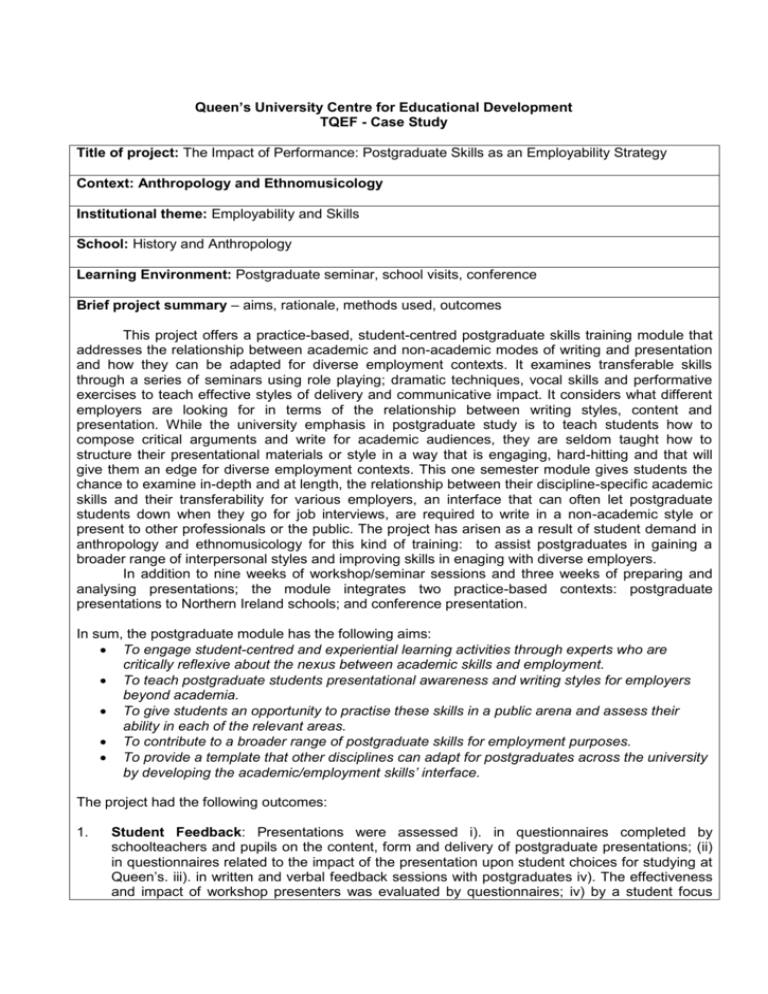
Queen’s University Centre for Educational Development TQEF - Case Study Title of project: The Impact of Performance: Postgraduate Skills as an Employability Strategy Context: Anthropology and Ethnomusicology Institutional theme: Employability and Skills School: History and Anthropology Learning Environment: Postgraduate seminar, school visits, conference Brief project summary – aims, rationale, methods used, outcomes This project offers a practice-based, student-centred postgraduate skills training module that addresses the relationship between academic and non-academic modes of writing and presentation and how they can be adapted for diverse employment contexts. It examines transferable skills through a series of seminars using role playing; dramatic techniques, vocal skills and performative exercises to teach effective styles of delivery and communicative impact. It considers what different employers are looking for in terms of the relationship between writing styles, content and presentation. While the university emphasis in postgraduate study is to teach students how to compose critical arguments and write for academic audiences, they are seldom taught how to structure their presentational materials or style in a way that is engaging, hard-hitting and that will give them an edge for diverse employment contexts. This one semester module gives students the chance to examine in-depth and at length, the relationship between their discipline-specific academic skills and their transferability for various employers, an interface that can often let postgraduate students down when they go for job interviews, are required to write in a non-academic style or present to other professionals or the public. The project has arisen as a result of student demand in anthropology and ethnomusicology for this kind of training: to assist postgraduates in gaining a broader range of interpersonal styles and improving skills in enaging with diverse employers. In addition to nine weeks of workshop/seminar sessions and three weeks of preparing and analysing presentations; the module integrates two practice-based contexts: postgraduate presentations to Northern Ireland schools; and conference presentation. In sum, the postgraduate module has the following aims: To engage student-centred and experiential learning activities through experts who are critically reflexive about the nexus between academic skills and employment. To teach postgraduate students presentational awareness and writing styles for employers beyond academia. To give students an opportunity to practise these skills in a public arena and assess their ability in each of the relevant areas. To contribute to a broader range of postgraduate skills for employment purposes. To provide a template that other disciplines can adapt for postgraduates across the university by developing the academic/employment skills’ interface. The project had the following outcomes: 1. Student Feedback: Presentations were assessed i). in questionnaires completed by schoolteachers and pupils on the content, form and delivery of postgraduate presentations; (ii) in questionnaires related to the impact of the presentation upon student choices for studying at Queen’s. iii). in written and verbal feedback sessions with postgraduates iv). The effectiveness and impact of workshop presenters was evaluated by questionnaires; iv) by a student focus 2. 3. 4. 5. group following the postgraduate seminars University Feedback: The broad findings of the school questionnaires were highlighted At the Anthropology and Ethnomusicology Research cluster meetings and the results influenced discussions about the rationale for student choice; programme options; and regional specialisations. Conference panel: As a case study of the effectiveness of this module and its impact upon employability and skills, a postgraduate conference was held from 30 April -1 May 2009 at which students presented work; participated as conference committee members; organised panels; chaired sessions; and acted as discussants. Final Report: The results of the programme and student evaluations are outlined in the report. TQEF drop-in day. A leaflet was prepared disseminating the work of the project and showcased in a poster and on powerpoint in the Great Hall. Evaluation and Reflection What benefits have there been for staff/students in your School/Academic Support Unit? It has given students greater confidence in self-presentation and therefore has improved their chances of employment uptake. It has extended the remit of the University and School of History and Anthropology’s policy on recruitment and widening student access. It has broadened the range of postgraduate skills and awareness of opportunities by working with experts who have considered the academic-employment interface critically both in the field of anthropology and beyond. It has given students the opportunity to practise their skills with the potential to influence younger students and encourage them to consider applying for study at Queen’s. Impact of the project on the institutional theme (identified above): This project was considered to be exemplary both in the School and the University. The principle of enhancing students’ understandings of public communication skills and their application within external arenas for recruitment purposes has led to the School rolling out this student ambassador component of the programme. Within the University the success of the programme was highlighted by Professor Gerry McCormac in the University’s Institutional Audit as a leading example of how Queen’s is addressing the student-employer interface. The model of combining training in presentational skills; employer expectations; and postgraduate practice with a public interface is one that can be adapted as a template for postgraduates across the university to develop a range of different academic/employer skills programmes. Advice And Tips – for anyone doing similar work (were there any challenges, issues, problems?): Organising school visits in addition to regular school career days was more difficult than anticipated. A long lead time is needed for setting up these kinds of visits as many of the schools originally identified and contacted to meet the widening participation criteria were not accustomed to accommodating class talks to be held as part of the school curriculum/day. Looking forward – where next for the project? The School has adopted my template of the student ambassador scheme in giving postgraduates the opportunity to engage their presentational skills in attending career days as representatives of History and Anthropology. Contact Details: Dr. Fiona Magowan, Director of Research, School of History and Anthropology, Tel: 028 90973740, Fax: 028 90973700, f.magowan@qub.ac.uk
